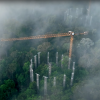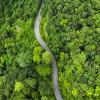
The Amazon forest stores large quantities of the climate-damaging greenhouse gas carbon dioxide (CO2). But deforestation, agriculture and rising temperatures bring this nature based solution to a limit. AmazonFACE brings together an international team of researchers aiming to address the question how the Amazon forest will respond to projected future CO2 concentrations. By using Free-Air CO2 Enrichment (FACE) technology we will generate process based understanding on the functioning of the world’s largest tropical rainforest, and therefore will be able to inform regional policies on climate change mitigation and adaptation strategies.

Please see below the link to a short film produced by our colleagues at HILAEA, which documents the design of the research facility including its infrastructure and the construction of the first 2 plots consisting of 16 towers spreading elevated CO2 into the Amazon forest between August 2022 and May 2024.
https://www.youtube.com/embed/c9zF3UaVUzg?si=A3yiqZhthrFQJTGq%22
News

22 November 2024
Systems analysis to tackle the monopolistic power in the era of AI
Digital sector incumbents have established themselves in the artificial intelligence (AI) space through new forms of commercial partnerships. Now, antitrust authorities are raising concerns about such arrangements and the impact this will have on the future direction of AI. To discuss the latest developments, Elena Rovenskaya delivered a presentation on the adoption of systems analysis approaches to identify complex interactions between players in the digital economy.

05 November 2024
How ecosystem restoration benefits national policies
IIASA scientists show that preserving ecosystems and fostering socioeconomic development is not a trade-off. On the contrary, an integrated approach is beneficial to national policies. We share examples from India, Brazil, and Indonesia.
02 October 2024
IIASA and Latin American Ambassadors explore new collaborative opportunities
On 23 September 2024, a distinguished delegation of Heads of Missions from the Latin American region, led by its Dean, Ambassador Juan Francisco Facetti Fernandez, Permanent Representative of Paraguay to the International Organizations in Vienna, visited IIASA to explore avenues for meaningful research collaborations.
